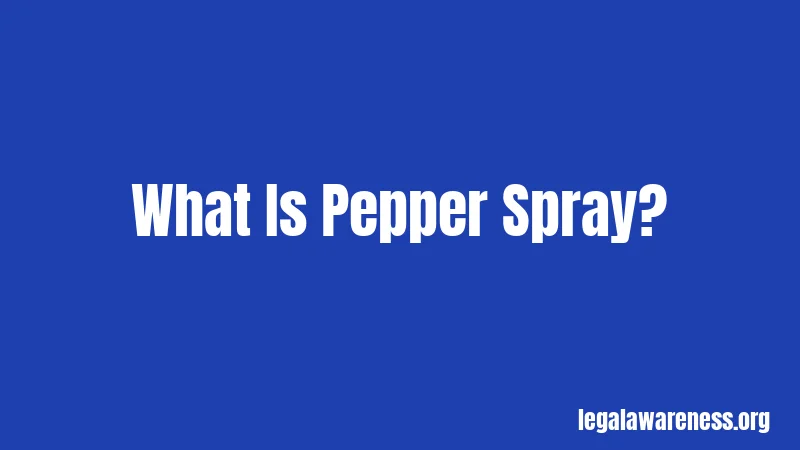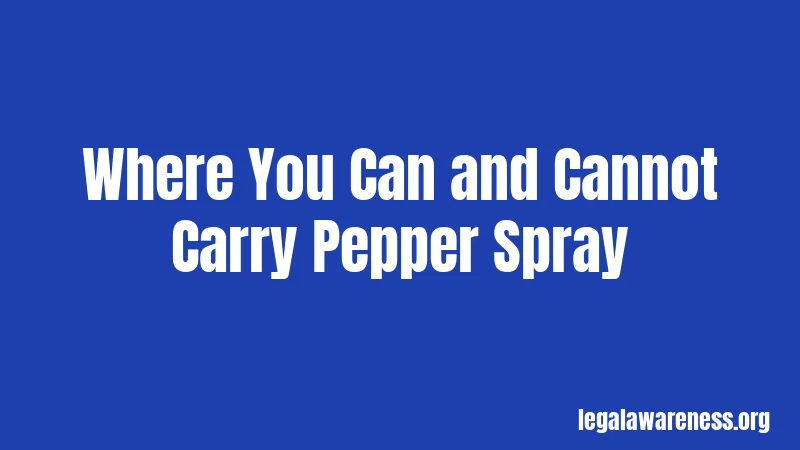Pepper Spray Laws in Pennsylvania (2026): What You Need to Know
Pepper spray is legal in Pennsylvania for most adults. This self-defense tool can help protect you in dangerous situations. However, you need to know the rules before you buy or carry it.
This article explains Pennsylvania’s pepper spray laws. You’ll learn who can carry it, where you can’t take it, and what happens if you misuse it.
What Is Pepper Spray?

Pepper spray is a self-defense tool that causes temporary pain. It contains oleoresin capsicum (OC). This is the same chemical that makes hot peppers spicy.
When sprayed in someone’s face, it causes burning eyes and skin. The person may have trouble breathing and seeing. These effects last for about 30 minutes. The spray gives you time to escape from danger.
Pepper spray is also called OC spray. It’s different from Mace. Mace contains different chemicals and is not legal in Pennsylvania.
Basic Pepper Spray Laws
Who Can Carry Pepper Spray
You must be 18 years old or older to buy and carry pepper spray in Pennsylvania. People with felony convictions cannot own pepper spray. Those with assault charges are also prohibited from having it.
You don’t need a license or permit to buy pepper spray. You can purchase it from stores or online. No background check is required for most buyers.
Legal Size and Type Requirements
Only pepper spray containing oleoresin capsicum (OC) is legal in Pennsylvania. Other chemical sprays like Mace are not allowed.
There’s some confusion about size limits. Some sources mention a 1.5-ounce maximum, while others say Pennsylvania has no specific size restrictions. Federal guidelines limit pepper spray to 5 ounces maximum and 18% OC concentration.
To be safe, choose pepper spray under 2.5 ounces. This meets most state guidelines and is easier to carry.
Where You Can and Cannot Carry Pepper Spray

Prohibited Locations
You cannot bring pepper spray into schools, government buildings, or courthouses. Airports and federal buildings also prohibit pepper spray.
Carrying weapons on school property can result in a first-degree misdemeanor charge. Penalties include up to five years in prison and fines up to $10,000.
You can pack pepper spray in checked luggage on planes if it has a safety mechanism and contains less than 2% tear gas. Bringing it in the cabin can result in felony charges and fines up to $25,000.
Where You Can Carry It
Pepper spray is legal in most public spaces including parks, streets, and shopping areas. You can carry it openly or concealed in these locations.
Some private businesses may have rules against pepper spray on their property. Always check posted signs or ask before entering.
Penalties and Consequences
Misuse Penalties
Using pepper spray to intentionally harm someone can result in misdemeanor assault charges under 18 Pa.C.S. Section 2701. Simple assault charges can be first, second, or third degree misdemeanors depending on the situation.
If you use pepper spray against a police officer, firefighter, or other law enforcement, you could face aggravated assault felony charges under 18 Pa.C.S. Section 2702.
Violations can result in fines, imprisonment, or both. The exact penalty depends on how you misused the pepper spray.
Self-Defense Protection
Pennsylvania law allows you to use force if you reasonably believe it’s necessary to protect yourself from unlawful force. Your belief must be reasonable, not just genuine.
The force you use should match the threat against you. Pepper spray is considered reasonable force against physical attacks.
Special Circumstances

Age Restrictions
People under 18 cannot own pepper spray in Pennsylvania. Some sources suggest 16 or 17-year-olds may carry it with parental consent, but most retailers require buyers to be 18.
Parents should check local laws before allowing minors to carry pepper spray.
Criminal Record Restrictions
Felons cannot carry pepper spray as it’s classified as a weapon. People with domestic violence convictions are also prohibited.
Those on probation or parole may face restrictions. People bound by protective orders in domestic violence cases might be barred from having weapons.
How to Legally Carry and Use Pepper Spray
Carrying Guidelines
Keep pepper spray in an accessible spot where you can reach it quickly in an emergency. A keychain or purse holder works well.
Test the spray occasionally to make sure it’s still working. Check expiration dates and replace as needed.
Never brandish or display pepper spray in a threatening manner. Only use it when facing an immediate threat.
Proper Usage
Pepper spray should only be used as a last resort when there’s a clear and immediate threat of harm. Don’t use it to resolve disputes or intimidate people.
Aim for the attacker’s face and eyes, then escape to safety. Inform law enforcement about any incident where you used pepper spray.
Training Recommendations
Consider taking training courses to learn proper pepper spray techniques. Training covers deployment methods, situational awareness, and legal considerations.
Basic training programs teach you how to aim and deploy spray effectively. They also cover strategies for assessing threatening situations.
Purchasing Pepper Spray in Pennsylvania
Where to Buy
You can buy pepper spray from gun shops, sporting goods stores, or pharmacies. Many people also purchase it online from trusted retailers.
When buying online, verify that the product is legal in Pennsylvania and meets state guidelines. Choose reputable dealers who guarantee their products comply with state laws.
What to Look For
Buy pepper spray that contains oleoresin capsicum (OC). Avoid products labeled as Mace or other chemical irritants. Choose canisters under 2.5 ounces to ensure compliance.
Look for products with safety mechanisms to prevent accidental discharge. Make sure the spray has clear instructions and expiration dates.
Recent Law Changes
Pennsylvania’s pepper spray laws have remained relatively stable. Some sources from 2025 mention individuals must be 16 or older, while most current sources require age 18. The 18-year minimum appears to be the standard requirement.
No major changes to carry restrictions or penalties have occurred recently. The laws focus on preventing misuse rather than limiting access for law-abiding adults.
Frequently Asked Questions
Do I need a permit to carry pepper spray in Pennsylvania?
No, you don’t need a license or permit to buy or carry pepper spray in Pennsylvania. It’s legal for most adults without special paperwork.
Can I carry pepper spray on college campuses?
While not illegal statewide, many colleges prohibit pepper spray on campus. Check your school’s specific policy before bringing it to campus.
What size pepper spray can I legally carry?
Pennsylvania doesn’t have explicit size restrictions, but federal guidelines limit canisters to 5 ounces maximum. Choose products under 2.5 ounces to be safe.
Can I use pepper spray against animals?
Yes, pepper spray can be used for defense against animals, but use products specifically designed for this purpose. Bear spray is legal in Pennsylvania for animal protection.
What happens if I accidentally spray someone?
Accidental discharge generally won’t result in criminal charges. However, you should get medical help for the person if needed and report the incident to authorities.
Final Thoughts
Pennsylvania’s pepper spray laws are designed to balance self-defense rights with public safety. Most adults can legally carry pepper spray for protection. The key is using it responsibly and only for self-defense.
Remember that pepper spray is not foolproof. It works best as part of a broader safety plan that includes awareness and escape strategies. Stay informed about the laws and practice using your pepper spray safely.
